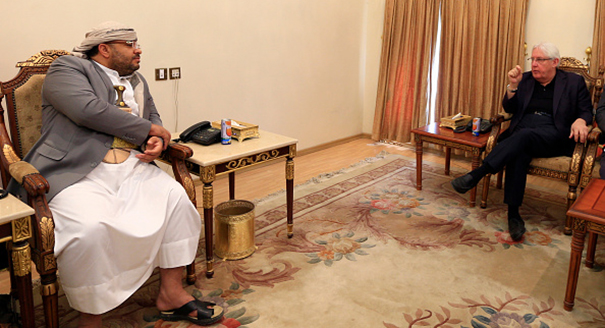After intense shuttle diplomacy, United Nations-brokered talks to resolve the Yemen conflict are scheduled to take place in Stockholm this week. The UN special envoy, Martin Griffiths, is trying to build trust among the warring parties by reopening San‘a airport, organizing prisoner swaps, and reactivating the services of Yemen’s Central Bank. His hope is to move toward a peace process and political agreement that ends the catastrophic war in the country.
So far, it seems that the first challenge, namely who would attend the talks, has been successfully addressed. Earlier this week, the Houthi delegation travelled to Oman on a Kuwaiti plane accompanied by Griffiths, and on Tuesday evening they arrived in Stockholm. The delegation of Yemeni President ‘Abed Rabbo Mansour Hadi is expected to follow on Wednesday. The UN envoy’s office refused to reveal the exact dates of the talks, but according to Hadi’s government the talks are set to begin tomorrow.
Regionally, there have been some signs of flexibility. The Saudi-led coalition said in a statement that it would allow the evacuation of 50 wounded persons from Houthi-controlled San‘a to Oman’s capital, Muscat, for humanitarian reasons as a confidence-building measure. On the other side, the Iranian Foreign Ministry affirmed that it backed talks and was ready to help find a political solution. Despite such actions, however, it remains unclear whether there is political will on either side to make the necessary concessions for peace.
This would not be the first negotiations among the Yemeni sides. Since 2015 there have been several rounds of peace talks, all of which have failed. This includes talks in Geneva in May 2015, talks in Kuwait in April 2016, and again talks in Geneva last September, which ended before they even began. Furthermore, there is a crisis of confidence between the Houthis and the Yemeni government, because since 2004 they have signed dozens of agreements, none of which lasted.
The failure of previous talks is a consequence of Yemen’s being caught up in a regional struggle for power. The Yemeni sides to the conflict no longer have much latitude to take decisions on their conflict, as both Iran and the Saudi-led coalition have the final say on matters. That is why any durable solution will require an understanding that involves Iran, Saudi Arabia, and the United Arab Emirates, which cannot be easy given the tensions between Riyadh and Tehran. Indeed, during the talks in Kuwait, the Yemeni sides reportedly had to consult their regional sponsors before agreeing to any of the points being raised. This made it especially difficult for the previous UN envoy to reach any sort of compromise, as the true decisionmakers were not at the table.
Moreover, as the conflict has dragged on, the United States, the United Kingdom, and Russia, among others, have begun investing in the Yemeni conflict by providing weapons and military support to the Saudi-led coalition, earning billions of dollars in the process. While this has allowed them to gain influence over all decisions pertaining to peace and war in Yemen, the mood in the West has changed lately. The horrific humanitarian costs of the war has led to campaigns aiming to end arms sales to the Saudi-led coalition, which is a major reason why the United States and European countries have backed the latest negotiations.
Inside Yemen, the conflict has created new divisions among Yemenis, making a comprehensive solution that much more difficult to achieve. In southern Yemen, in areas under the control of the Hadi government, the UAE-backed Southern Transitional Council is not represented in the peace talks, and does not believe it should be concerned by them. On the other hand, the party of the late president, ‘Ali ‘Abdullah Saleh, which had 50 percent of representatives in previous talks, will not have the same level of representation in the current round in Stockholm. The reason for this is that the party has fragmented into several wings.
In addition, there may be another barrier to the success of the talks, namely the real intentions behind what the parties hope to achieve. According to several reports, in addition to confidence-building measures, the agenda will address handing over the Hodeidah port to the United Nations. This means that the talks, rather than seeking to eliminate the causes of the Yemeni conflict, may be more focused on managing specific matters within the conflict. This suggests that the future of any potential agreement will be especially fragile.
While most of Yemenis are looking for a glimmer of hope to end four years of a devastating war, many analysts already view this round of peace talks as just the latest in a series of failed efforts. What brought it about was not a genuine desire by the parties to find a solution, but pressure on Saudi Arabia, reinforced by strong suspicions that Saudi officials played a role in the murder of journalist Jamal Khashoggi. That is why Griffiths’ mission will be tough, as both Iran and Saudi Arabia, the real decisionmakers in the conflict, remain far apart.






